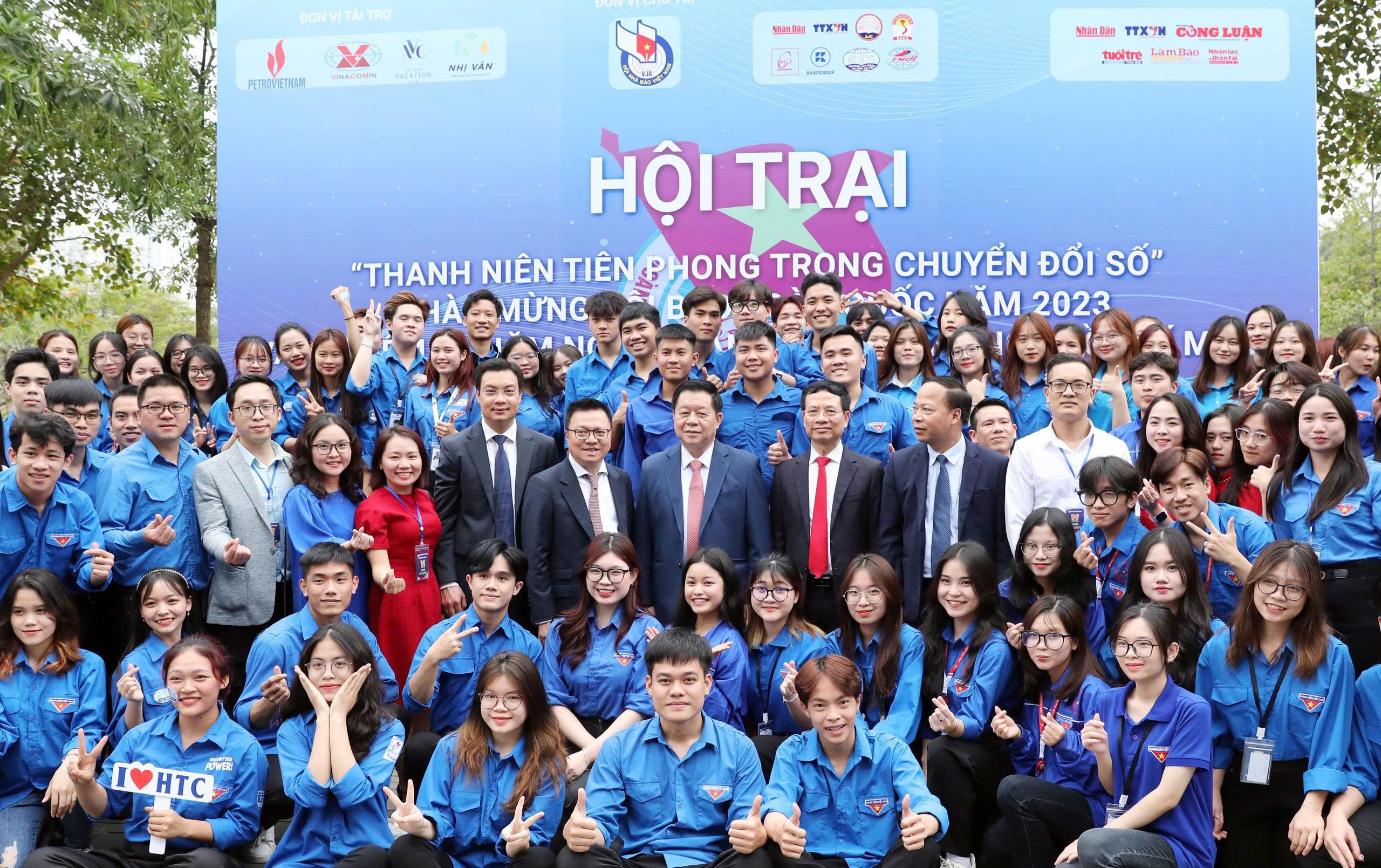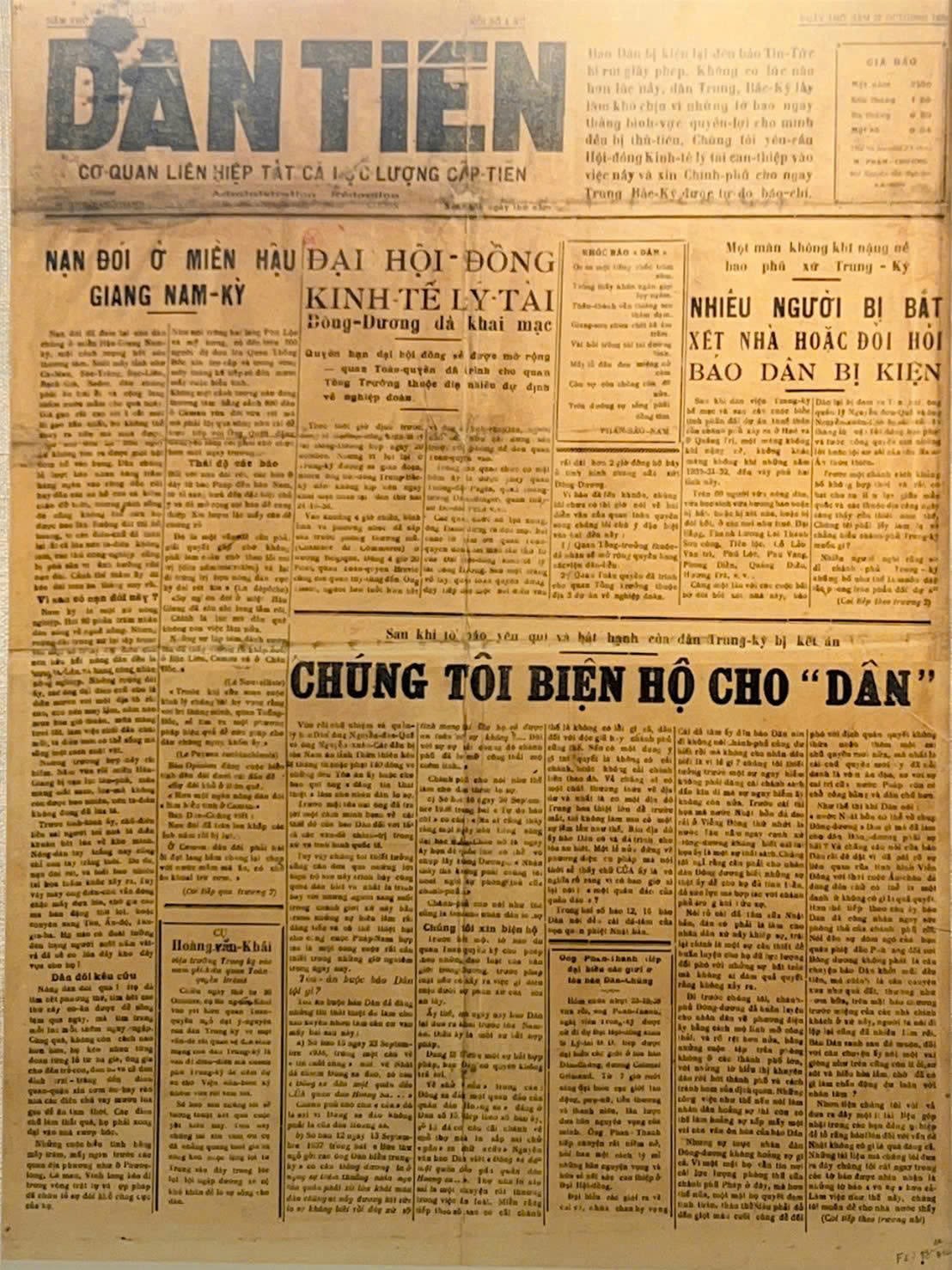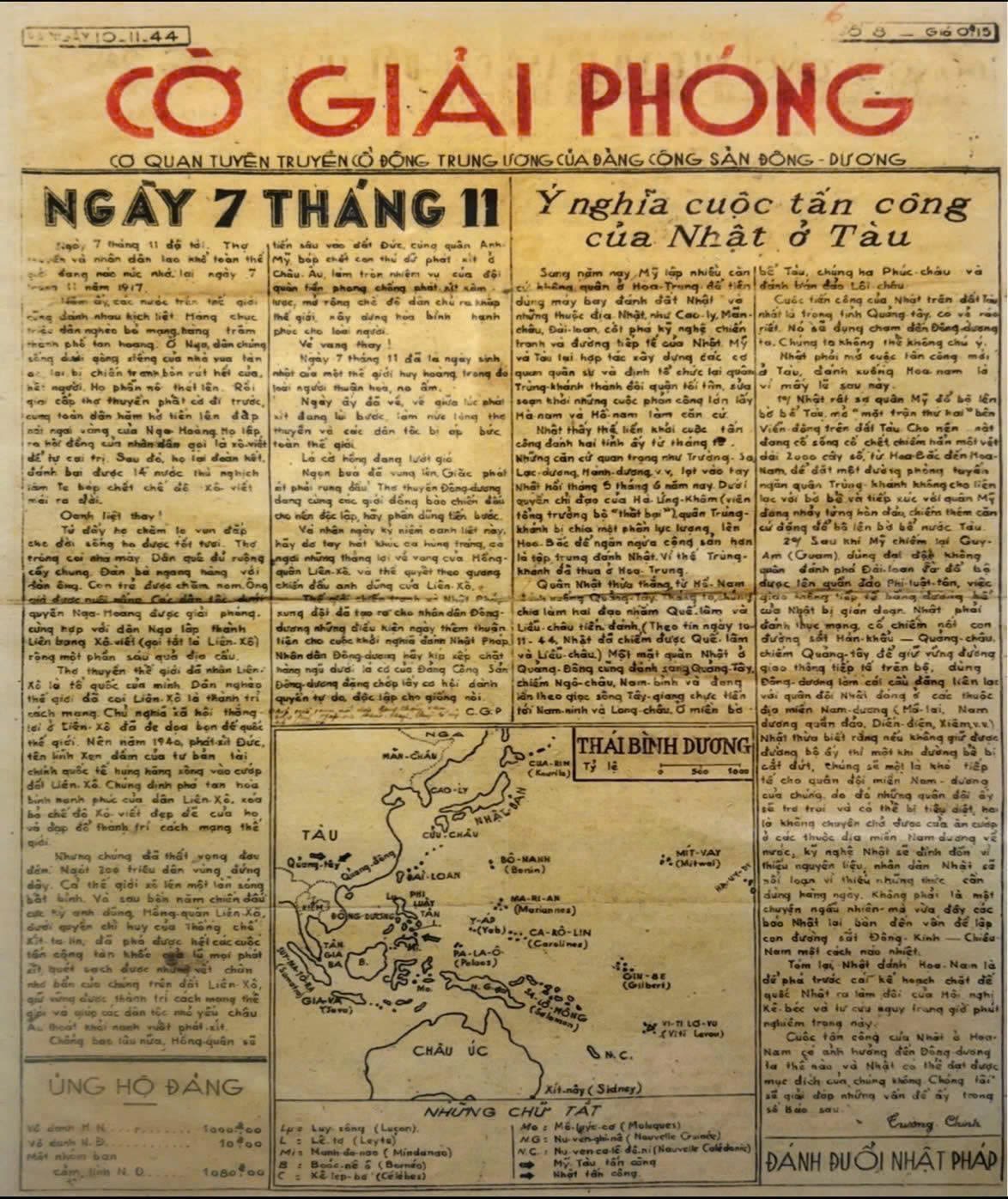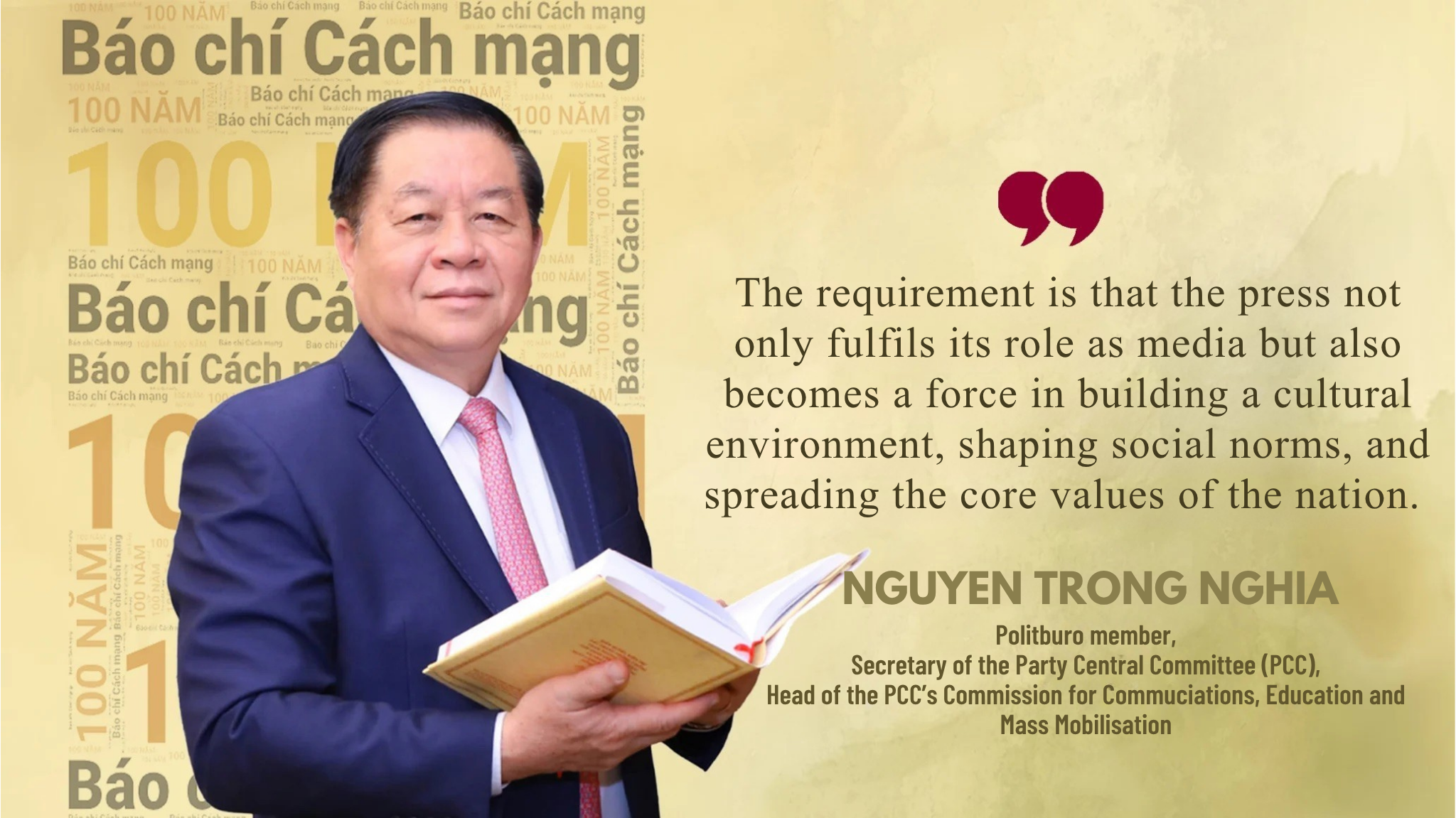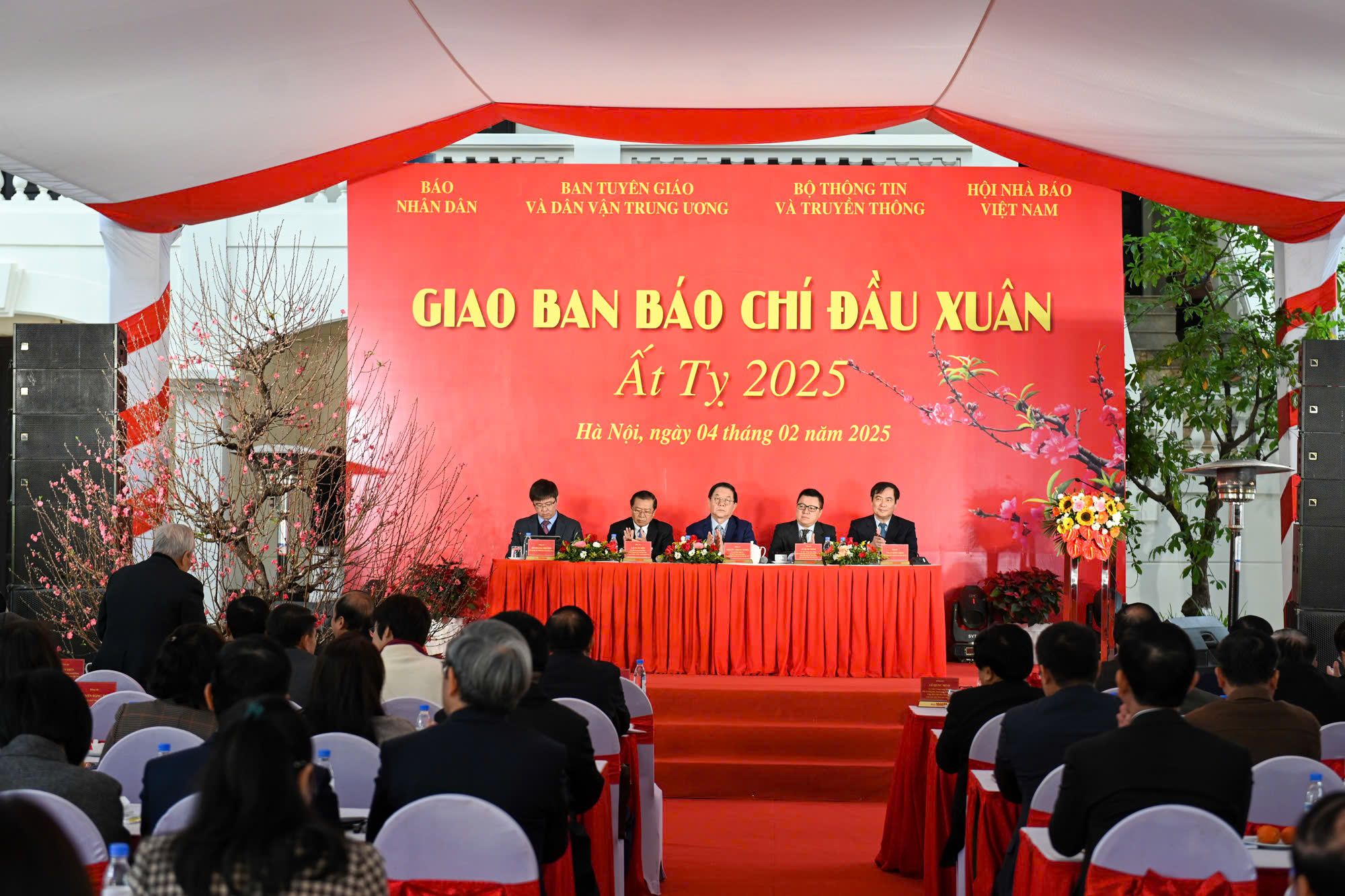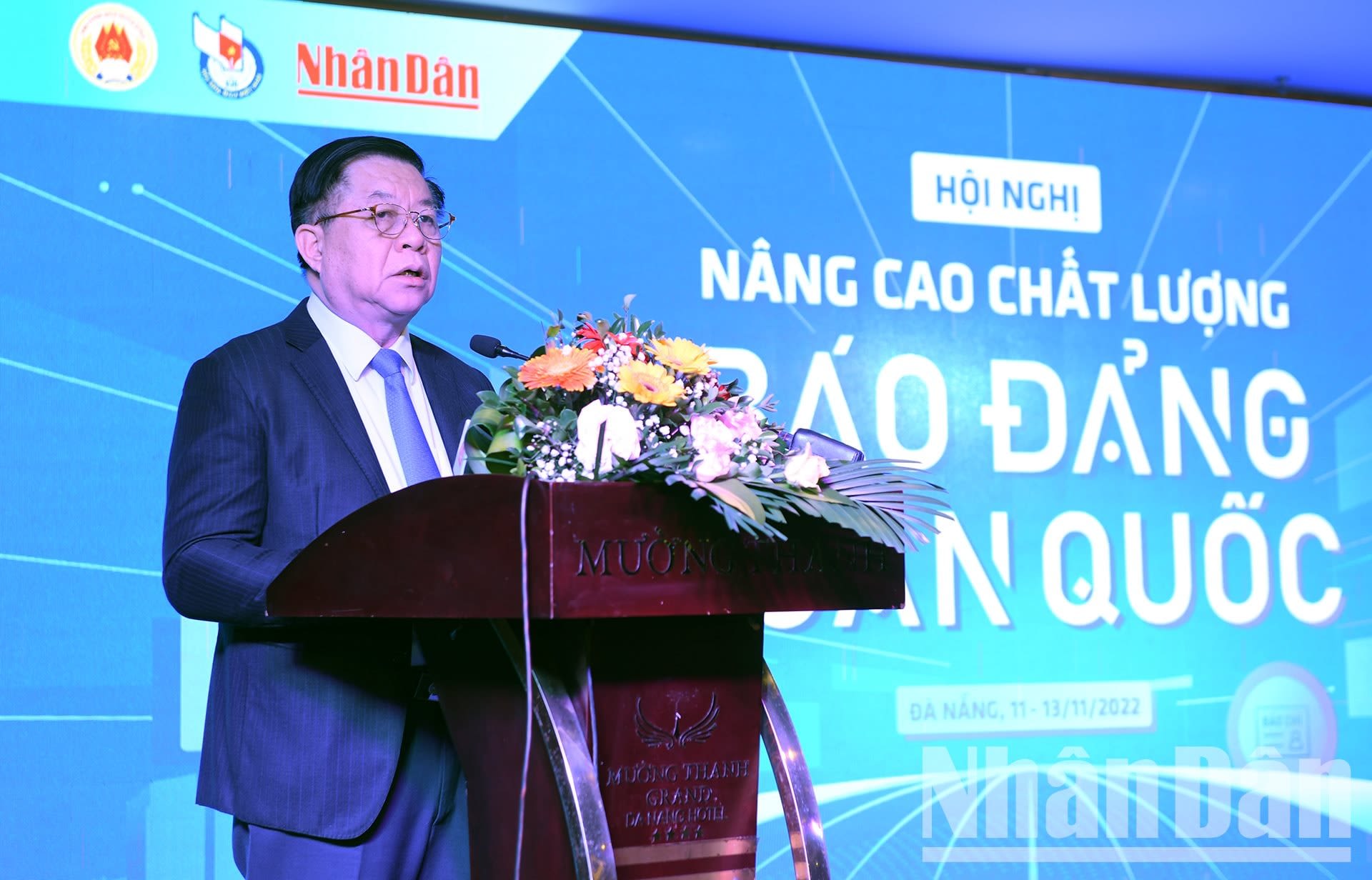
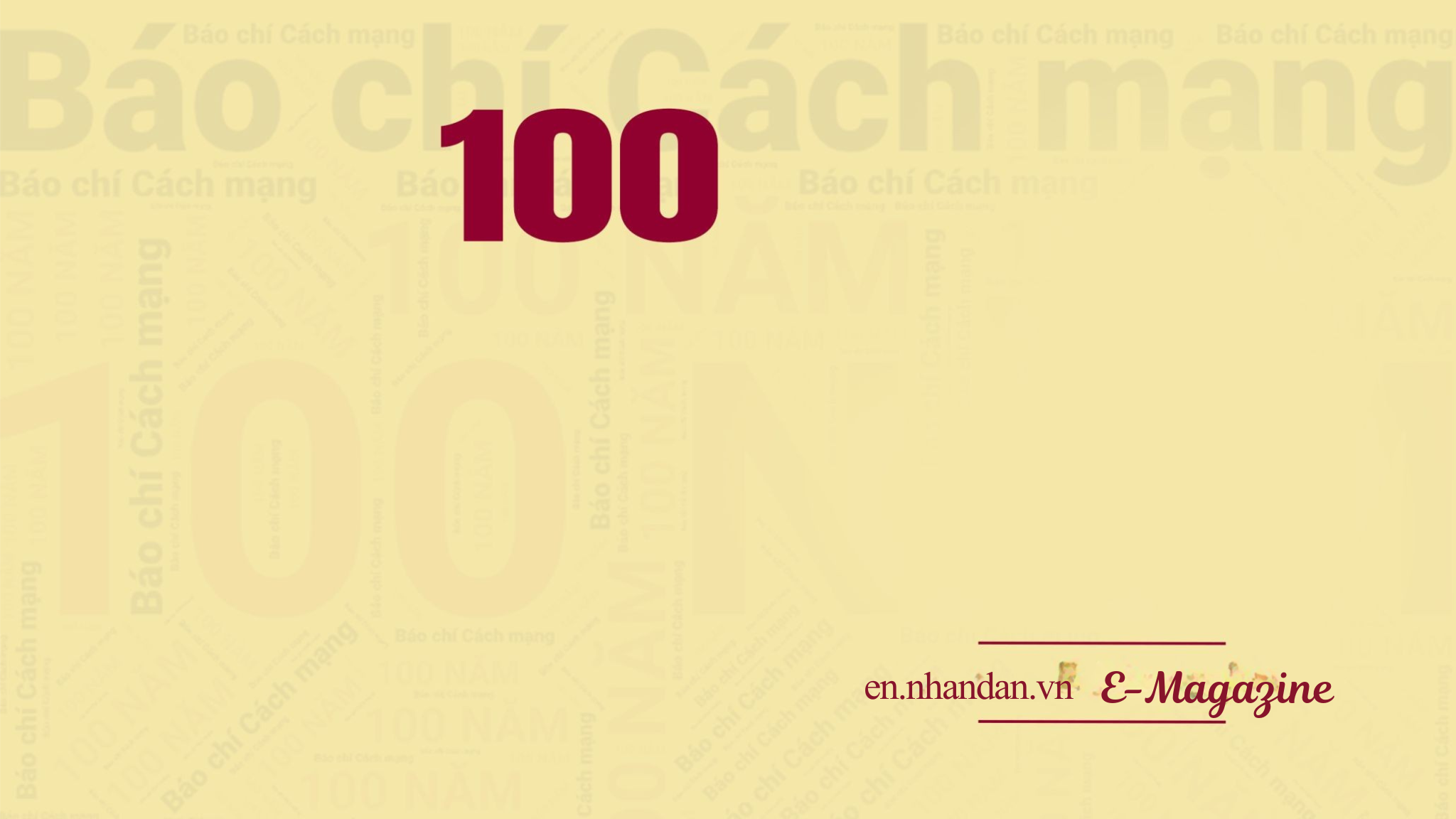
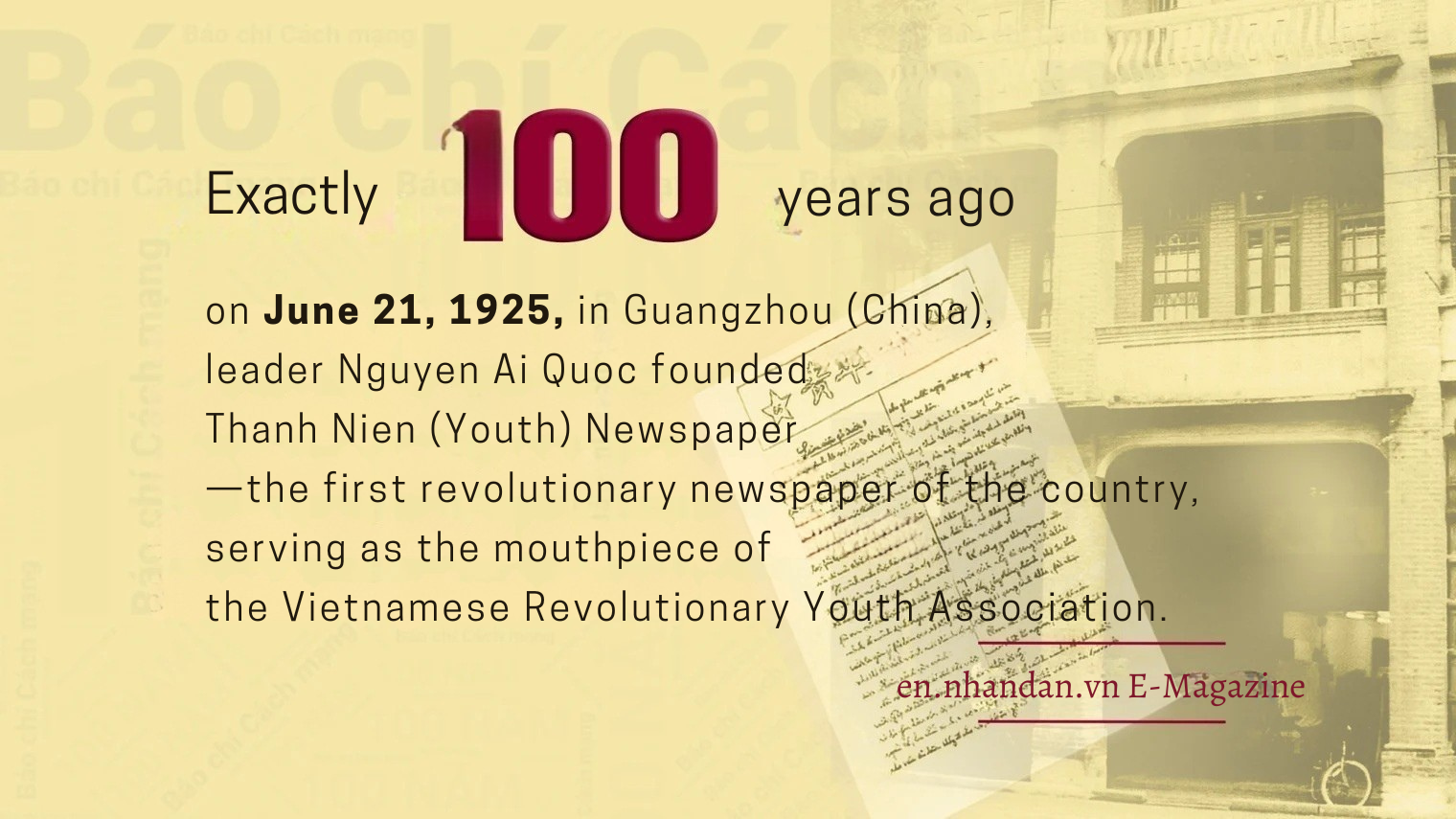

Through Thanh Nien Newspaper, Nguyen Ai Quoc skillfully combined the dissemination of Marxism–Leninism with the path of national salvation tailoured to the pressing needs of the Vietnamese revolution at the time. His work gradually led the patriotic scholars and intelligentsia, who had been trapped in despair and uncertainty in the late 19th century and at the turn of the 20th century, out of their ideological darkness.
Through the revolutionary press, Communist organisations were formed and developed, ultimately leading to the birth of the Communist Party of Viet Nam on February 3, 1930.
Over the past century, Viet Nam revolutionary press has undergone rapid, strong, and solid development, becoming a key and pioneering force in the revolutionary cause of the Party and the people.
From operating in secrecy to working publicly, from the struggle for national liberation to national reconstruction, from leading the cause of Doi Moi (Renewal) to embracing deep international integration, the revolutionary press has always been a vanguard force on the Party’s ideological and cultural front. It serves as the trusted voice of the Party, State, and people, as well as a vital bridge between Viet Nam and international friends.
During his lifetime, President Ho Chi Minh constantly reminded journalists of “having a firm political stance. Politics must take the lead. Only with a correct political line will all other tasks be properly executed. Therefore, all our newspapers must adhere to the correct political line.” In his speech at the third Congress of the Viet Nam Journalists’ Association, he emphasised: “Journalists are also revolutionary soldiers. Their pens and paper are sharp weapons.” In a telegram to the Asian-African Journalists Association, he declared: “For us journalists, the pen is a sharp weapon, the article is a revolutionary manifesto.”
He further encouraged and reminded journalists: “Your pens are also sharp weapons in the cause of supporting justice and opposing evil.” The Vietnamese press has made outstanding contributions to the Doi Moi cause, to industrialisation and modernisation, to the building and safeguarding of the Fatherland, and to international integration. It has led the way in disseminating the Party's policies and the State’s laws; celebrated and affirmed the achievements and lessons of reform; participated actively in protecting national sovereignty over seas and borders; fought against evil, backwardness, corruption, wastefulness, and negativity; defended the Party's ideological foundation; and helped defeat hostile forces' strategy of "peaceful evolution." Most journalists strive to embody the virtues of “keen vision, pure heart, and sharp pen,” wholeheartedly serving the Fatherland and the people.
Politburo Member, Secretary of the Party Central Committee (PCC), and Head of the PCC’s Commission for Communications, Education and Mass Mobilisation Nguyen Trong Nghia; member of the PCC Le Quoc Minh, who is also Editor-in-chief of Nhan Dan Newspaper, Chairman of the Viet Nam Journalists’ Association and Deputy Head of the PCC’s Commission for Communciations, Education and Mass Mobilisation; and other leaders from the press and journalism associations pose for a photo with journalism students at the 2023 National Press Festival.
Politburo Member, Secretary of the Party Central Committee (PCC), and Head of the PCC’s Commission for Communications, Education and Mass Mobilisation Nguyen Trong Nghia; member of the PCC Le Quoc Minh, who is also Editor-in-chief of Nhan Dan Newspaper, Chairman of the Viet Nam Journalists’ Association and Deputy Head of the PCC’s Commission for Communciations, Education and Mass Mobilisation; and other leaders from the press and journalism associations pose for a photo with journalism students at the 2023 National Press Festival.
In addition, press activities still have some limitations and weaknesses, some of which are long-lasting: Some press agencies have deviated from their principles, purposes, and target audiences; have not attached importance to setting examples, encouraging, and promoting new factors, advanced models, “good people, good deeds”, indulged in information about the negative aspects of society, and their way of reporting lacks humanity and education; a number of journalists have taken advantage of the name of the press for personal gain, profiteering, violating the law, and violating professional ethics; participating in social networks lacking standards and responsibility; some representative offices and resident reporters do not operate in accordance with their functions, tasks, and powers, allowing many mistakes and negativity to occur; The situation of “the newspaperisation of magazines and electronic information pages” has not been fundamentally overcome.
The political and ideological struggle on the battlefield of journalism and media, whether in wartime or peacetime, whether in subsidy or market times, is always fierce and complicated; in the current period, that nature and challenge are even higher and more intense than before. The scientific and technological revolution, especially in terms of information technology and the trend of globalisation , are taking place strongly and deeply, creating many opportunities and great challenges. The ways of receiving and exchanging information (the Internet, websites, personal blogs; artificial intelligence (AI); multi-dimensional interaction in information); ideological trends and tendencies are infiltrating and affecting the country more and more strongly and multi-dimensionally. Opportunistic, reactionary, hostile forces are intensifying their sabotage against us in many aspects, especially in the fields of politics, ideology, culture, journalism, and media.
The political and ideological struggle waged through journalism and the media, whether in wartime or peacetime, during the centrally planned era or the market economy, has always been intense and complex.
NGUYEN TRONG NGHIA
Politburo member, Secretary of the Party Central Committee, Head of the PCC’s Commission for Communications, Education and Mass Mobilisation
Proud of the glorious tradition of the Vietnamese revolutionary press, more deeply aware of the important responsibilities of the press in the new revolutionary period, closely following the spirit of the Draft Document of the 14th National Party Congress on “building a professional, humane, modern press, publishing, and media”. The requirement is that the press not only fulfils its role as media but also becomes a force in building a cultural environment, shaping social norms, and spreading the core values of the nation. The value system of the Vietnamese people of “patriotism, humanity, loyalty, honesty, solidarity, diligence, creativity" has been built, consolidated, and developed through media, education, and culture.
To do so, the press needs to fulfil its function of reflecting, orienting, and criticising society; at the same time, strengthen its role in educating and spreading the belief and aspiration for national development. Along with promoting communications for party congresses at all levels towards the 14th National Party Congress, the important task at this time is that the press needs to focus on building a systematic, scientific, and in-depth propaganda plan, creating a spread so that all cadres, party members and people can grasp and deeply understand it, thereby effectively implementing the four Resolutions of the Politburo: Resolution No. 57-NQ/TW dated December 22, 2024. on breakthroughs in science and technology development, innovation and national digital transformation; Resolution No.59-NQ/TW dated January 24, 2025 on “International integration in the new situation”; Resolution No.66-NQ/TW on innovation in law-making and enforcement to meet the requirements of national development in the new era; Resolution No.68-NQ/TW dated May 4, 2025 on private economic development. This is a very important requirement for the press because the above four Resolutions will be the “Quad Pillars” to help the country “take off”, “the fundamental institutional pillars, creating a strong driving force to bring the country forward in the new era, realising the vision of a developed Vietnam with high income by 2045” as stated by General Secretary To Lam at the recent National Conference to disseminate and implement Resolution No.66-NQ/TW and Resolution No.68-NQ/TW of the Politburo.
In the context of globalisation and technological advancement, the press must continuously innovate its methods of operation and apply modern technologies to promptly meet the growing demand for diverse information, while safeguarding the ideological values of the Party in contemporary society. The press must contribute to the creation of a healthy “digital cultural space,” promoting a positive lifestyle, a spirit of dedication, social responsibility, civic awareness, and intelligent consumer culture. One of the most urgent tasks is to enhance the capacity, moral integrity, political resolve, and professional competence of journalists. Emphasis should be placed on training a workforce that is both talented and virtuous, politically steadfast, professionally proficient, and well-versed in modern communication technologies. At the same time, it is essential to foster journalism models that integrate with education, culture, and science to improve content quality and expand its social impact.
In this context, the core mission of the press is not merely to reflect information, but also to actively shape a positive ideological space, establish progressive value systems, guide public opinion, and contribute to building a healthy cultural environment. The press must become a highly interactive ideological institution, grounded in real life and capable of leading society through ideals, culture, and revolutionary ethics. There is a need to continue streamlining the organisational structure of the press towards greater efficiency and effectiveness. This process not only rectifies operations within the media sector but also creates conditions for deeper investment in technology, human resources, and journalistic products, thereby enhancing the strengths of each media organisation and press format. However, it must be clearly understood that streamlining does not mean diminishing the role of the press. Rather, it aims to help media organisations better and more accurately fulfil their mission of information and communication, serving the interests of the Party, the State, and the people in a more substantial and effective manner. The Party and the State will continue to invest in the resources, finance, and infrastructure needed to ensure the best possible conditions for the press to fulfil its role and mission.
Vietnamese press must develop in a synchronised manner across its organisation, governance, and technology to meet the contemporary demands of the digital era.
The global media landscape is undergoing profound changes with the rise of social media, artificial intelligence, big data, and transnational platforms, bringing unprecedented challenges and opportunities in the history of press. The rapid advancement of science and technology, particularly AI, cross-border digital platforms, integrated media, and social networks, has fundamentally altered the way information is produced, distributed, and consumed. Traditional concepts such as the newsroom, copyright, journalist identification, content moderation, violation handling, and the role of mainstream media in shaping public opinion are facing significant challenges.
Nguyen Trong Nghia, Politburo Member, Secretary of the Party Central Committee (PCC), and Head of the PCC’s Commission for Communications, Education and Mass Mobilisation, attends the press conference marking the beginning of the 2025 New Year, held at Nhan Dan Newspaper headquarters.
Nguyen Trong Nghia, Politburo Member, Secretary of the Party Central Committee (PCC), and Head of the PCC’s Commission for Communications, Education and Mass Mobilisation, attends the press conference marking the beginning of the 2025 New Year, held at Nhan Dan Newspaper headquarters.
Vietnamese press must evolve comprehensively in terms of structure, management, and technology to meet the requirements of development in the digital age. Media organisations need to transform their newsroom models towards content – technology – human resource convergence, develop multi-platform media products, and innovate information delivery methods to achieve broader social impact. Every newsroom must become a digital content production hub, where modern technology converges with ideological conviction.
Each journalist must strive to become a skilled and professional soldier in the modern media environment, capable of adapting to new technologies, investing in content quality, and building trust with readers. Journalists are not merely information providers; they must also act as guides, heightening public awareness and fostering intelligent and responsible information consumption.
A pressing and strategically important task is to revise and supplement the Press Law in order to complete the legal framework, materialise the Party’s guidelines and policies in the field of journalism, and address existing weaknesses. This must be done in alignment with the dynamic evolution of the modern media landscape and the orientation for developing revolutionary journalism in the new era.
Comrade Nguyen Trong Nghia, Politburo member, Secretary of the PCC, and Head of the PCC’s Commission for Communications, Education and Mass Mobilisation, works with major political press agencies.
Comrade Nguyen Trong Nghia, Politburo member, Secretary of the PCC, and Head of the PCC’s Commission for Communications, Education and Mass Mobilisation, works with major political press agencies.
The amended Press Law must more clearly reflect the revolutionary and socialist nature of Vietnamese journalism. It should help strengthen mechanisms for supervision and management while ensuring an environment that encourages creativity, fosters fair competition, promotes innovation and aids in the diversification of information products. This is not solely the task of lawmakers, but requires the proactive engagement, intellectual contributions, and responsible voices of journalists, media governing bodies, and society as a whole.
Each legal provision must accurately reflect the realities of social life while creating conditions for press agencies to fulfil their role in guiding public opinion, mastering the information space, and resisting being absorbed into market currents or overwhelmed by forces that distort and manipulate information.
Comrade Nguyen Trong Nghia, Politburo member, Secretary of the PCC, and Head of the PCC’s Commission for Communications, Education and Mass Mobilisation, speaks at the 2022 national conference on improving the quality of Party newspapers.
Comrade Nguyen Trong Nghia, Politburo member, Secretary of the PCC, and Head of the PCC’s Commission for Communications, Education and Mass Mobilisation, speaks at the 2022 national conference on improving the quality of Party newspapers.
The 100th anniversary of Vietnamese Revolutionary Journalism is not only an opportunity to reflect on a glorious journey, but also an opportunity to reaffirm the political, cultural, and social mission of journalism in the country’s new phase of development. Over the past century, revolutionary journalism has devoted itself wholeheartedly to serving the noble cause of the Party and the people through all historical upheavals. In the century to come, journalism must continue to lead public opinion, create trust, safeguard ideological foundations, and inspire the aspiration for a prosperous and happy nation.
Viet Nam revolutionary press will remain a pillar of ideology and a driving force for the development of Vietnamese culture and people, contributing to the building of a strong and prosperous country.
With the Party’s comprehensive leadership, a proud revolutionary tradition, and a team of dedicated, intelligent, and courageous journalists, we have every reason to believe that Vietnamese revolutionary journalism will continue to be a pillar of ideology and a vital force for advancing the country’s cultural and human development—paving the way for a stronger and more prosperous Viet Nam.
---------------------
Published: June 2025
Design: NGOC DIEP, NDO
Translation: NDO
Photos: THANH DAT, VNA

